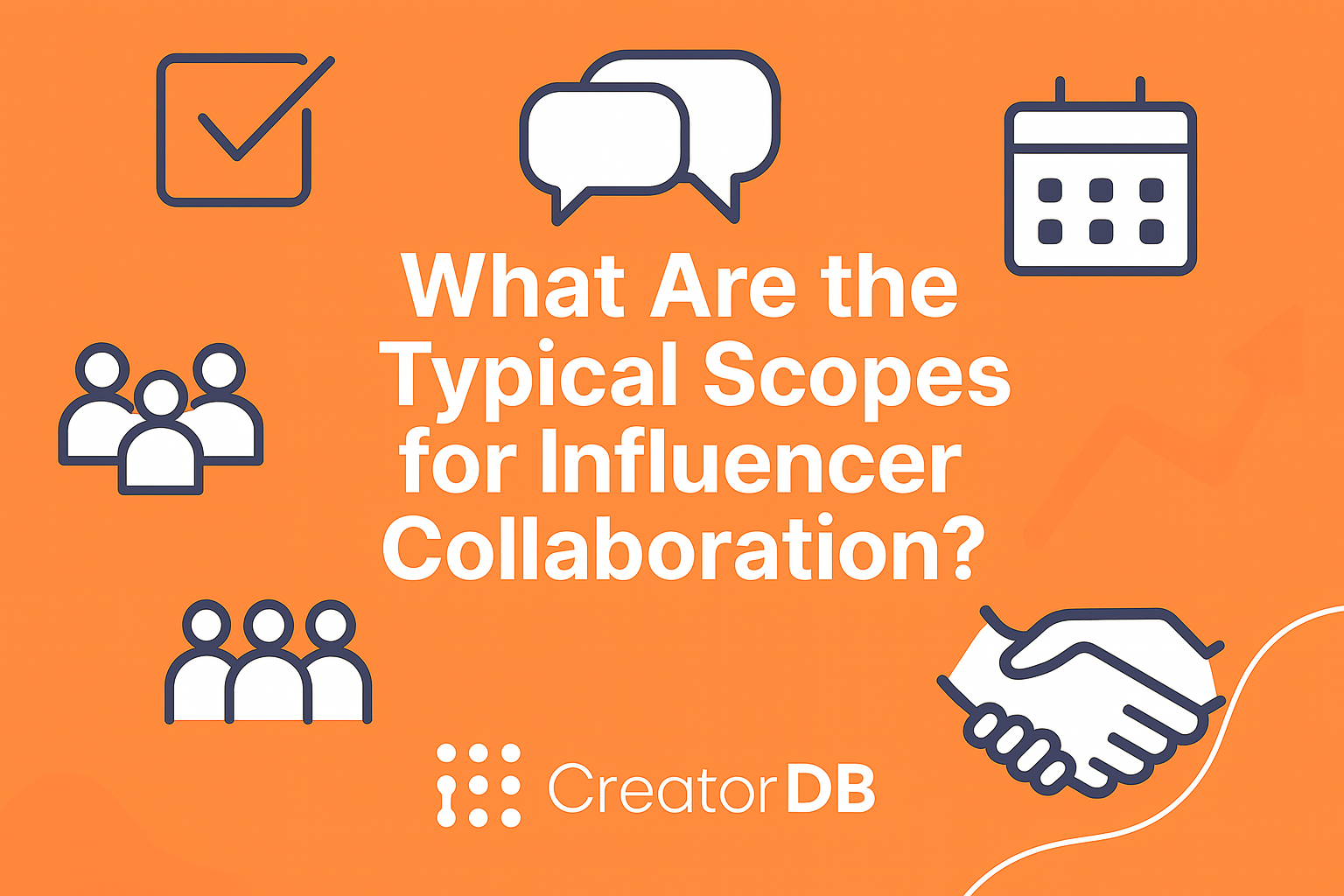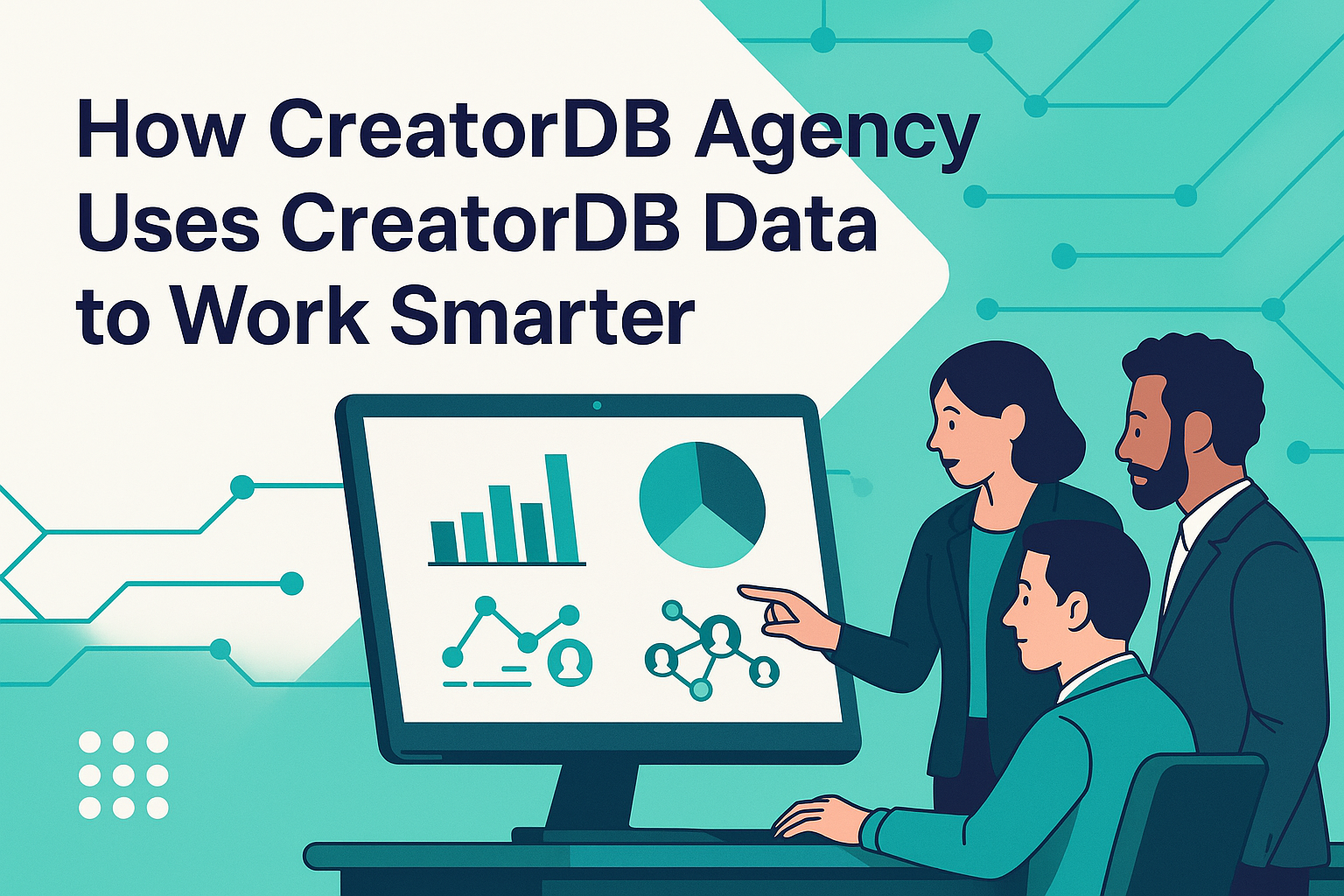In today’s digital age, businesses are constantly seeking effective marketing strategies to gain an edge over their competitors. One such strategy that has gained significant attention is social proof marketing.
Social proof, a concept deeply rooted in human psychology, has the power to influence consumer behavior and drive conversions.
In this article, we will delve into the psychology behind social proof marketing, exploring its various forms and how businesses can leverage its power to attract and retain customers.
How Social Proof Works?
Definition and Importance
Social proof refers to the psychological phenomenon where individuals rely on the actions and decisions of others to determine their own behavior.
It is a powerful tool in marketing as it taps into the innate human desire to conform and seek validation from their peers.
By showcasing social proof, businesses can establish trust, credibility, and influence over their target audience.
Evolutionary Roots
The concept of social proof can be traced back to our evolutionary history.
In primitive societies, conforming to the behaviors of the group was crucial for survival. Individuals who deviated from the group’s actions risked isolation and potential danger.
As a result, our brains have developed a deep-rooted inclination to follow the crowd, which manifests in modern-day consumer behavior.
What are the Types of Social Proof?
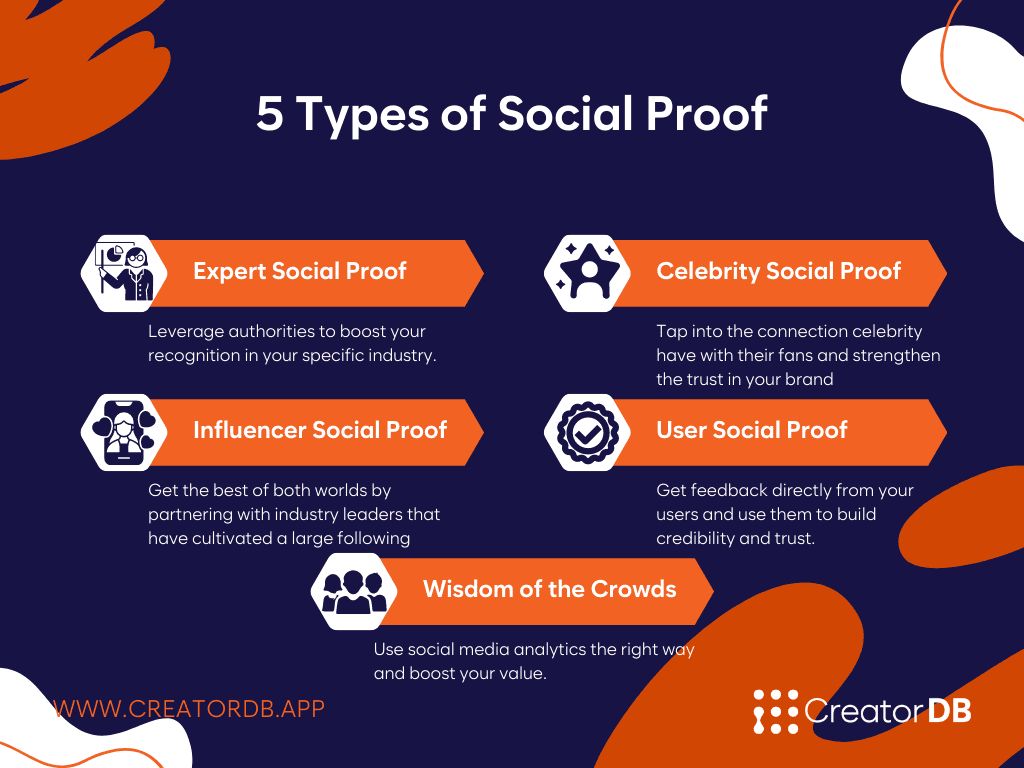
Expert Social Proof
Expert social proof involves leveraging the authority and expertise of credible individuals or organizations to influence consumer decisions.
This form of social proof is commonly seen in endorsements by industry experts, professionals, or renowned organizations, providing validation and credibility to a product or service.
Yakult has a long history of partnering with health and fitness experts to promote its probiotic drink:
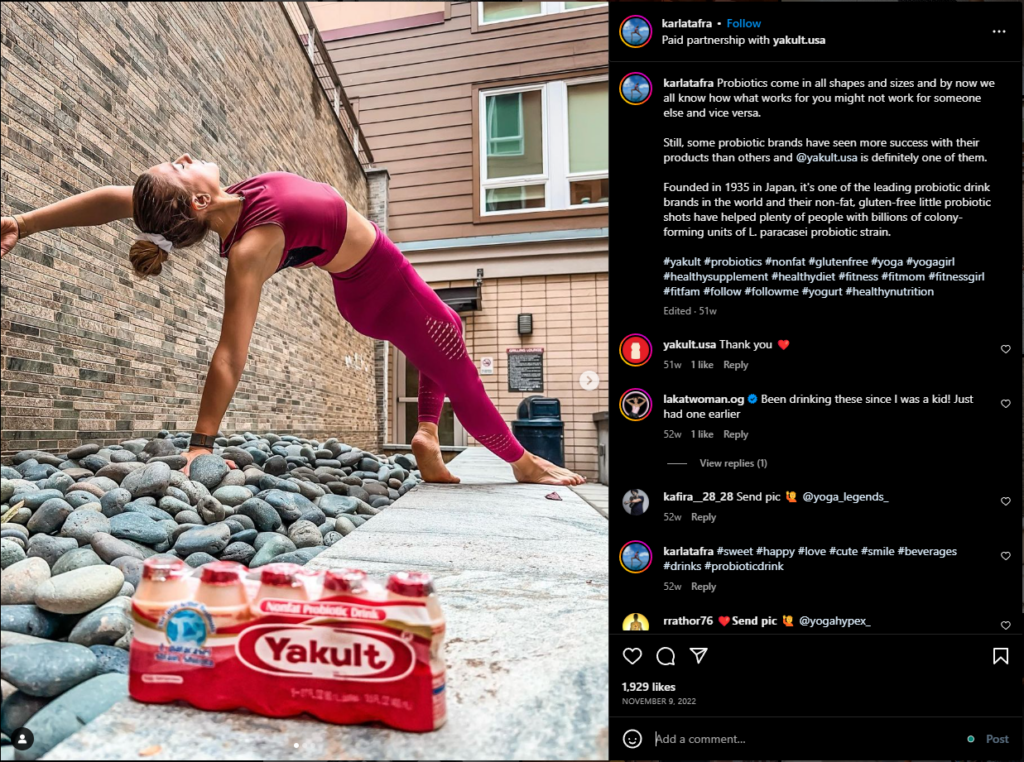
Celebrity Social Proof
Celebrity social proof relies on the influence and popularity of well-known personalities to endorse products or services.
By associating their brand with a recognizable figure, businesses can tap into the emotional connection that fans have with their favorite celebrities, increasing trust and generating interest.
For the release of a new event in World of Tanks Blitz, Wargaming partnered with Joanna Jędrzejczyk, 5 times UFC Strawweight Champion, to promote the event:

Influencer Social Proof
Influencer social proof stands in the middle between expert and celebrity social proof.
While in a sense influencers are celebrities themselves more often than not they are catering to smaller audiences that follow them because of the nature of the content they produce.
By associating with the right influencers a brand can show to understand and value the input from the community around their products.
Surfshark is a great example of influencer social proof. It showcases some of the most striking quotes about its product on its front page:

User Social Proof
User social proof involves leveraging the experiences and opinions of existing customers to influence potential buyers.
Testimonials, reviews, and ratings play a significant role in this form of social proof.
Positive user feedback can build trust and credibility, while negative feedback can raise concerns or prompt improvements.
For example, Derila uses various social proof strategies in its marketing like influencers, media appearances, and experts’ opinions. But heavily features the reviews it gets from its clients on its front page to show authenticity and trustworthiness:

Wisdom of the Crowds
The wisdom of the crowds is based on the belief that a large group’s collective opinion or behavior can be a reliable indicator of what is popular or desirable.
This form of social proof is often seen in social media metrics such as the number of followers, likes, shares, or comments.
The more significant the numbers, the greater the perceived value or quality of a product or service.
But this is not the only way, Fraîcheur built impressive media coverage, and is not afraid to show it, making rapidly evident how many voices vouch for their product:
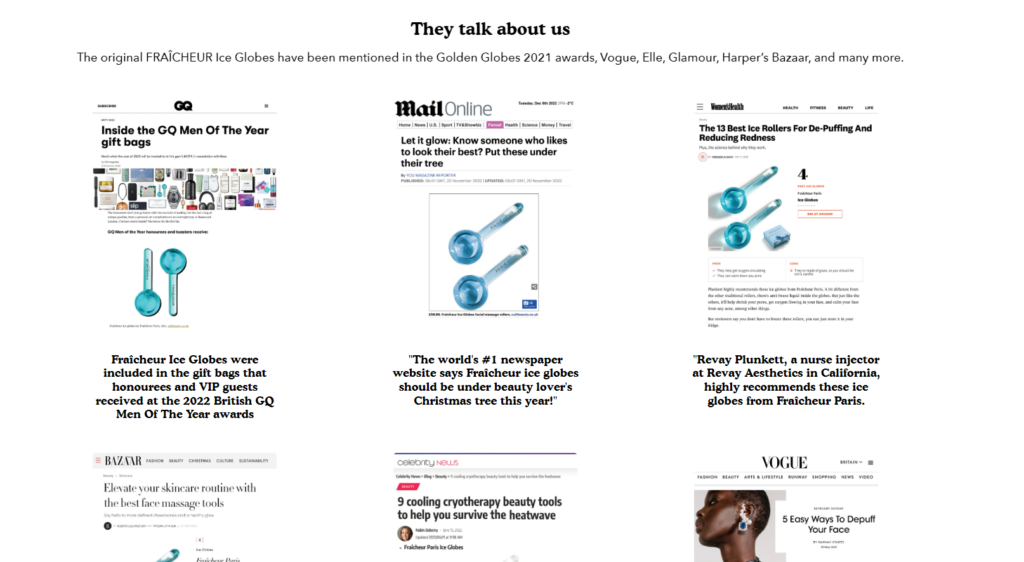
The Psychology of Social Proof Explained
Cognitive Bias: Informational Social Influence
Informational social influence occurs when individuals conform to the actions or decisions of others because they believe that others possess more knowledge or information.
This cognitive bias often leads to the assumption that “if many people are doing it, it must be the right thing to do.”
Businesses can leverage this bias by showcasing the popularity or widespread adoption of their offerings.
Emotional Impact: Normative Social Influence
Normative social influence taps into the human need for acceptance and belongingness.
When individuals observe others engaging in certain behaviors or making particular choices, they often feel compelled to conform to fit in.
By highlighting how a product or service aligns with social norms or trends, businesses can trigger the emotional desire to be part of a larger community.

Find Your
Perfect Influencer
Match Instantly
How to use Social Proof in Marketing?
Testimonials and Reviews
Displaying authentic testimonials and positive reviews from satisfied customers can be a persuasive form of social proof.
By sharing real-life experiences, businesses can showcase the benefits and quality of their offerings, easing potential customers’ concerns and building trust.
Influencer Collaborations
Partnering with influencers with a strong following in a specific niche can significantly impact consumer behavior.
When influencers endorse a product or service, their audience perceives it as a recommendation from a trusted source, leading to increased interest and potential conversions.
User-Generated Content
Encouraging customers to create and share content related to a brand or product can amplify social proof.
User-generated content showcases genuine experiences and creates a sense of community around the brand, strengthening brand loyalty and attracting new customers.
Social Media Engagement
Active engagement on social media platforms allows businesses to showcase real-time interactions with customers.
Responding to comments, addressing concerns, and sharing user-generated content can create a positive perception and generate social proof by demonstrating that others find value in the brand’s offerings.
Expert Endorsements
Identify influential experts or industry leaders in your field and seek their endorsements. This can be done through collaborations, guest blog posts, or interviews.
Expert opinions provide a valuable stamp of approval and can significantly enhance your brand’s reputation and credibility.
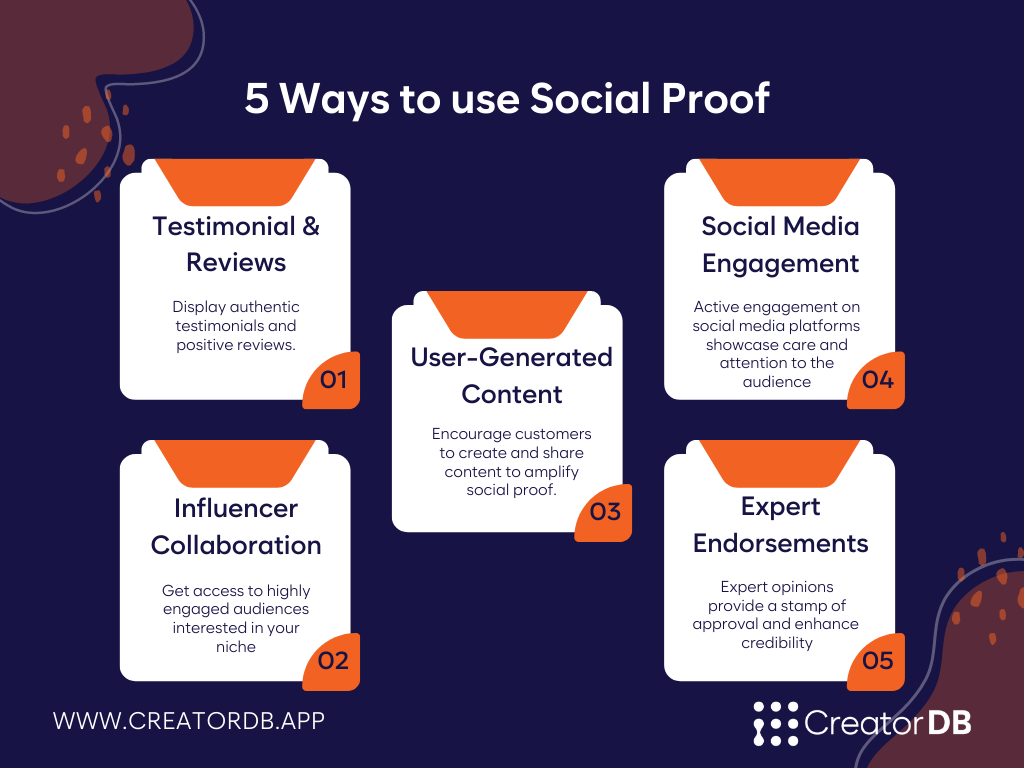
How Does Social Proof Impact on Consumer Behavior?
Building Trust and Credibility
Social proof plays a vital role in building trust and credibility among potential customers.
When they see others actively engaging with your brand and expressing satisfaction, it alleviates doubts and reduces perceived risks. Trust is a critical factor in the decision-making process, and social proof provides the necessary reassurance to potential customers.
Influencing Purchase Decisions
The power of social proof lies in its ability to influence consumer behavior.
When individuals observe others purchasing or recommending a product, they feel compelled to follow suit due to the fear of missing out (FOMO) or the desire for social acceptance.
By strategically showcasing social proof, businesses can influence potential customers’ purchase decisions and drive sales.
Enhancing Perceived Value
Social proof marketing can enhance the perceived value of your products or services.
When potential customers witness others positively engaging with your offerings, it creates a sense of desirability and exclusivity.
By associating your brand with satisfied customers, influencers, or industry experts, you elevate its perceived value, making it more attractive to consumers.
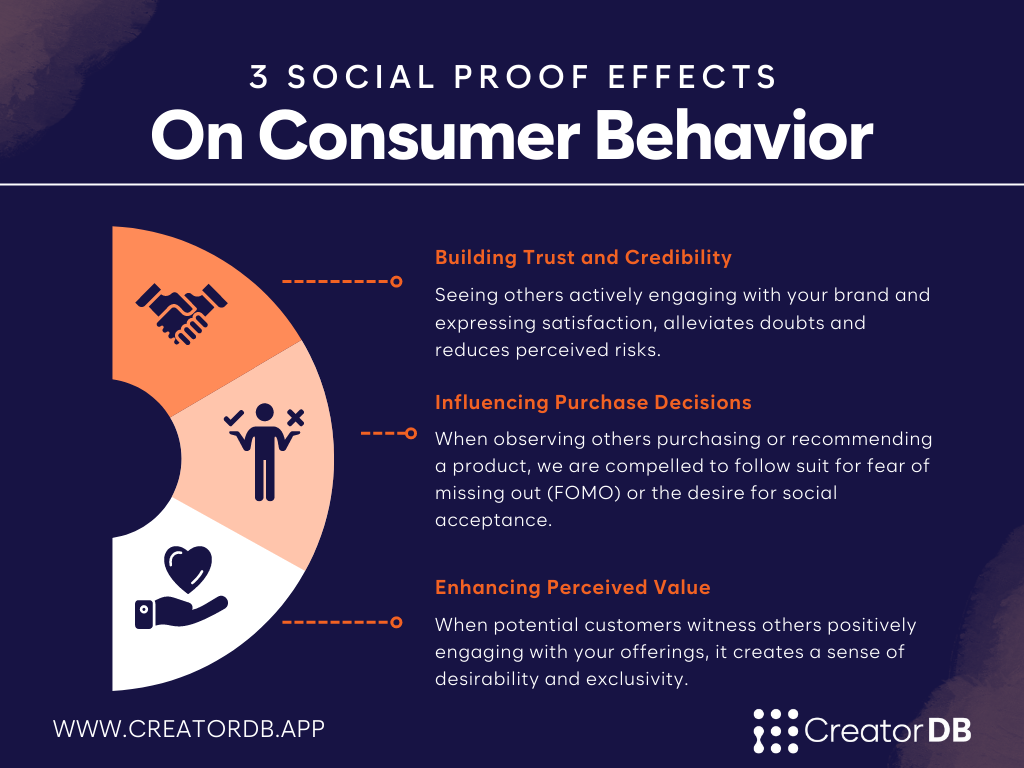
Examples of Successful Social Proof Campaigns
BYDFi and Customer Reviews
BYDFi effectively utilized customer reviews on third-party platforms to establish credibility and trust.
By promoting reviews of their platform they were able to create a solid track record that new users investigating the platform could easily find.
Read how CreatorDB helped BYDFi consolidate its trust and recognition.
Fraîcheur and Social Proof
Fraîcheur partnered with popular celebrities, media companies, and influencers in their target market to endorse their new product line.
The association with the brand generated significant buzz and social media engagement, resulting in increased brand awareness and a boost in sales.
Read how CreatorDB helped Fraîcheur diversify its social proof with influencers.
Surfshark and Social Media Influencers
Surfshark collaborated with influencers to showcase their product’s unique features and benefits.
Through genuine and authentic content, they were able to reach a highly engaged audience and generate social proof, leading to increased product adoption and brand recognition.
Read how CreatorDB helped Surfshark dominate the searches about VPN in Taiwan.

Find Your
Perfect Influencer
Match Instantly
How to Overcome Challenges in Social Proof Marketing
Authenticity and Trust
Maintaining authenticity is crucial in social proof marketing.
Businesses must ensure that the social proof they showcase is genuine and reflects real customer experiences.
Faking or manipulating social proof can lead to a loss of trust and credibility, ultimately damaging the brand’s reputation.
Balancing Quantity and Quality
While social proof relies on numbers and metrics, businesses must strike a balance between quantity and quality.
Displaying an overwhelming amount of social proof without considering its relevance or impact may dilute its effectiveness.
It is essential to curate and showcase the most compelling forms of social proof to drive meaningful engagement.
Mitigating Negative Social Proof
Negative social proof, such as publicized customer complaints or low ratings, can undermine a brand’s reputation.
Addressing and resolving negative feedback promptly and transparently is crucial to mitigate its impact.
By actively engaging with customers and demonstrating a commitment to improvement, businesses can turn negative experiences into positive ones.
What are the Future Trends in Social Proof Marketing?
Artificial Intelligence and Personalization
Advancements in artificial intelligence (AI) allow for personalized social proof experiences.
AI-powered algorithms can analyze user behavior and preferences to provide tailored recommendations and social proof content, enhancing the overall customer experience and driving conversions.
Gamification and Interactive Experiences
Incorporating gamification elements and interactive experiences can boost engagement and social proof.
By creating interactive quizzes, challenges, or contests, businesses can encourage customer participation and generate user-generated content, fostering a sense of community and authenticity.
Conclusion
Social proof marketing taps into the fundamental aspects of human psychology to influence consumer behavior.
By understanding the psychology behind social proof and leveraging its various forms, businesses can build trust, and credibility generating interest in their products or services.
Authentic testimonials, influencer collaborations, user-generated content, and social media engagement are powerful tools that can drive conversions and foster long-term customer relationships.
FAQs
1. Does social proof marketing work for all industries?
Social proof marketing can be effective across various industries, but its impact may vary depending on the target audience and the nature of the products or services.
It is essential to understand your target market and tailor your social proof strategies accordingly.
2. Is it better to have a few influential testimonials or many testimonials from regular customers?
Both influential testimonials and testimonials from regular customers can be valuable forms of social proof.
The choice depends on your target audience and the message you want to convey.
Influential testimonials can provide immediate credibility, while regular customer testimonials showcase widespread satisfaction.
3. How can I ensure the authenticity of user-generated content?
To ensure the authenticity of user-generated content, encourage customers to provide honest feedback and experiences.
Implement moderation processes to filter out any irrelevant or inappropriate content.
Engage with customers and respond to their content to show genuine appreciation for their contributions.
4. Can negative social proof be turned into a positive?
Yes, negative social proof can be turned into a positive if handled effectively.
Address negative feedback promptly, empathize with customers’ concerns, and take visible actions to resolve the issues.
By demonstrating your commitment to improvement and customer satisfaction, you can turn negative experiences into positive ones.
5. How can businesses stay ahead with social proof marketing in the future?
To stay ahead with social proof marketing, businesses should keep an eye on emerging trends and technologies.
Incorporating personalization through AI-driven recommendations and creating interactive experiences can help businesses stand out and provide unique social proof experiences for their customers.




